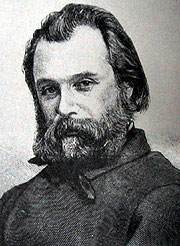Olof Eneroth
Per Olof Emanuel Eneroth (born April 15, 1825 at Gut Hägersten in Brannkyra near Stockholm , † May 21, 1881 in Uppsala ) was an author, head of the Swedish Horticultural Society and one of the most important Swedish pomologists of the 19th century.
Life
Eneroth was the son of the homonymous estate inspector Olof Eneroth and his wife Eva Cronlands. At the age of four he lost his father, who was only fifty years old. Then he grew up in Södermark together with his sister with his grandmother under rather poor circumstances and attended high school in Stockholm. During their visits, he developed an intimate relationship with his mother, who is described as highly educated, although she received little support due to her childhood in the poorer class. Even then, he did not spend his holidays in the city, but in the country, which may be the reason for his later interest in nature. After attending school, Eneroth began studying at Uppsala University in 1845, where he took the philosophical candidate exam in 1849 (today comparable to a Bachelor's degree ). He then continued his studies until he broke them off for health reasons and made trips to southern France , Spain and Brazil . From 1853 to 1855 he completed an apprenticeship as a gardener and at the same time earned his doctorate in philosophy . In 1855 he took a trip to Germany to study landscape gardening and plant culture. Back in Sweden he worked as a landscape gardener. During a few months of gardening activity at Säfstaholm Castle , he met Fredrika Bremer , on whose advice he applied to be a gardener for a company in Visby . During periods of depression, under which Eneroth was suffering at that time, she advised him to continue on this path in order to gain a reputation as a landscape gardener similar to that of his friend, the American landscape architect Andrew Jackson Downing . In 1855 he traveled to Northern Germany for a few months to study landscape architecture there. He stayed for some time at the Agricultural Academy Eldena , which he later reported in detail in his book Horticulture and Nature Beautification Art . When he returned, he was also active as such, planning new parks based on new knowledge. In 1856 he visited northern Sweden and Norway, where he attended conferences in Hamar and Christiania . Deviating from the advice of Fredrika Bremer, he successfully applied as a teacher at the Swedish Horticultural Society in Stockholm in 1856 , where he was appointed head of the institute a year later.
Government grants made it possible for him to go on study trips to Scotland, England and France in the spring of 1857. During one such trip to Germany in the autumn of 1858, he first added fruit-growing studies to his studies . In the same year he was also appointed a member of the Royal Swedish Academy of Forestry and Agriculture . A year later he toured Holland and Belgium. In 1862 and 1863 he undertook pomological studies in the southern and central part of his native Sweden. He continued this in 1864 during a trip to Germany. He had to cancel his planned trip to Switzerland in 1866 because of his poor health. In 1868 he was back in Denmark and Norway. He himself said of these trips in the 1860s that they were not only started out of pomological interest, but also to study "the country and its people".
He also had the opportunity to travel because he resigned as head of the horticultural institute in 1861 and then worked as a freelance landscape architect and pomologist, and between 1863 and 1869 wrote his four-volume work on school pedagogy. As a horticulturist he planned several parks and was heavily inspired by English parks and gardens. In fruit growing he tried to find the best native varieties as well as imported ones that would acclimate to the harsh Nordic climate. Its deliberate selection resulted in increased yields for the grower.
In the 1870s, Eneroth received a pension from the Academy for Agriculture. His health deteriorated more and more. In 1976, he determined in his will that his estate should be used for a foundation to set up a professorship from the interest of his assets. The first chair holder of the endowed professorship that still exists today (2014) was David Katz in 1937 . Eneroth died in Uppsala in 1881.
Honors
- 1858: Member of the Royal Swedish Academy for Forestry and Agriculture
- 1860: Knight of the Vasa Order
- Member of the “Society of Sciences” in Gothenburg
- Large gold medal of the "Royal Swedish Academy for Forestry and Agriculture"
See also
Web links
- Literature by and about Eneroth on libris.kb.se (accessed October 2, 2014)
literature
- Joachim Schnitter: Anguis in herba: Garden education and world refinement in the life's work of the Swedish agitator Olof Eneroth , disserta Verlag, 2011 online at googlebooks
- Joachim Schnitter: Anguis in herba: Olof Eneroth's subversive gardening education . In: Die Gartenkunst 21 (2/2009), pp. 240–250.
Individual evidence
- ↑ a b c d e Eneroth in the Svenskt biografiskt lexikon (SBL)
- ^ Angela Pfennig: Horticulture as a cultural task; The influence of Ferdinand Jühlke (1815-1893) on the development of garden culture in the 19th century , dissertation, p. 87 ff. Online as a pdf
- ↑ a b c d Eduard Lucas : Olof Eneroth In: Pomologische Monatshefte 1881, p. 231 ff. Online as pdf
| personal data | |
|---|---|
| SURNAME | Eneroth, Olof |
| ALTERNATIVE NAMES | Eneroth, Per Olof Emanuel (full name) |
| BRIEF DESCRIPTION | Swedish pomologist, writer and reform pedagogue |
| DATE OF BIRTH | April 15, 1825 |
| PLACE OF BIRTH | Brannkyra near Stockholm |
| DATE OF DEATH | May 21, 1881 |
| Place of death | Uppsala |

